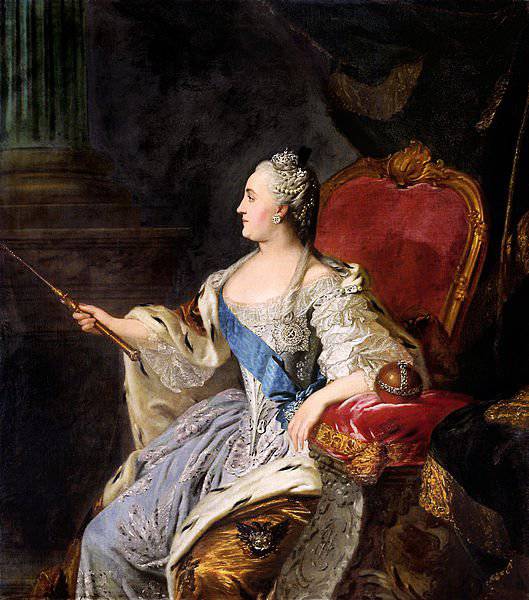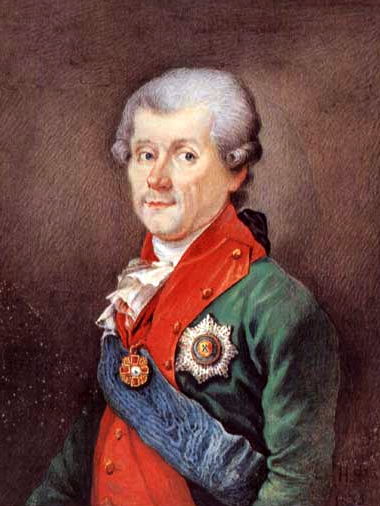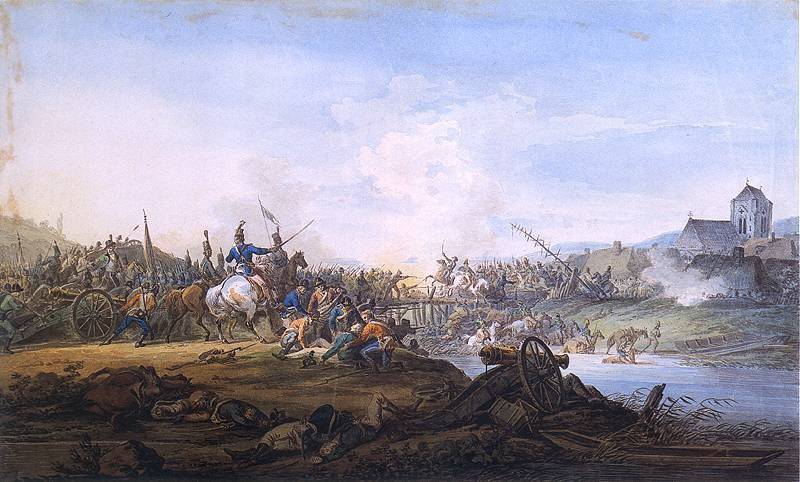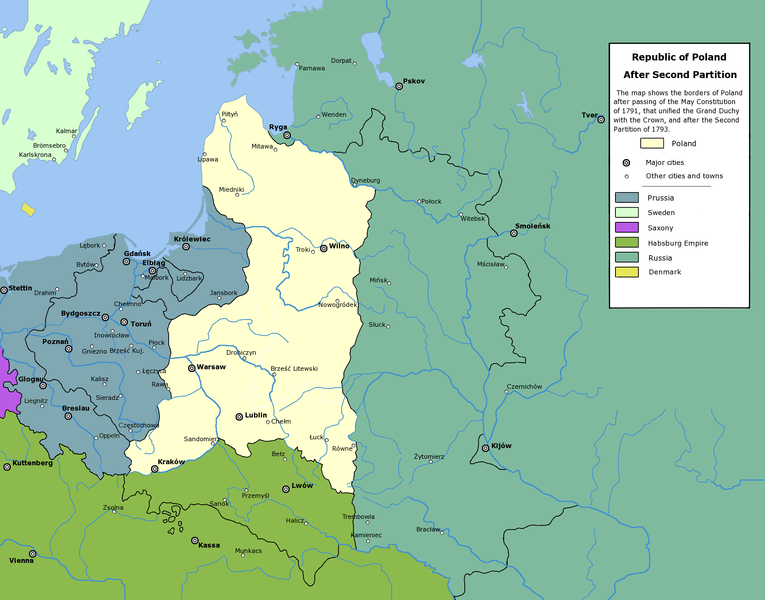Decomposition of Polish statehood. Rise of Kosciuszko. Part of 3
At the beginning of 1787, Empress Catherine II Alekseevna began her famous journey to Tavrida. In Kiev, waiting for her gallery "Dnepr". The Dnieper River was still the border between Russia and the Polish-Lithuanian Commonwealth. In Kanev, Catherine met with the Polish king Stanislav Poniatovsky. The king proposed to conclude a Russian-Polish military alliance, and he linked it with permission to carry out a number of reforms, which were supposed to strengthen the royal power in Poland. Catherine was against reforms, not wanting to disrupt the established order in the Commonwealth, fearing for the newly established peace.
The first section of the Commonwealth was a great shock for Warsaw and led to the beginning of reforms. The king and his supporters tried to restore order in a dying power. Among the innovations was the establishment of a “permanent council” (“Rada Nieustająca”) chaired by the monarch from 18 senators and 18 gentlemen (at the option of the Sejm). The council was divided into 5 departments and exercised executive authority in the kingdom. The king gave the right to advice to lease the land of the "kingdom". The council represented the king of three candidates for office and the monarch had to approve one of them. Administrative and financial reforms were carried out, the National Education Commission was established (the Education Commission), the army was reorganized and reduced to 30 thousand soldiers, indirect taxes and salaries to officials were established.
The National Education (Education) Commission was the first agency in Europe that served as the Ministry of Education. Rome liquidated the Jesuits Order, which in Poland controlled mainly the system of educational institutions created by him. The commission took over the property of the liquidated Jesuit Order and began to work on the establishment of universal and compulsory education for children of all classes and the revival of the country through education. The programmatic and methodological guidelines of the Commission were based on the ideas of British and French educators and thinkers. The Commission reformed the system of primary, secondary and higher education, giving it a secular character, expanded the range of natural science disciplines, introduced the basics of physical education and approved teaching in Polish. The territory of the state was divided into ten educational districts and Polish and Lithuanian educational provinces. There were four districts in the Lithuanian province. The administrative functions were performed by the higher school: in the Lithuanian province - the Main School of the Grand Duchy of Lithuania, in Poland - the Yagellona University. In general, the activities of the Commission had a positive impact on Poland, contributed to the development of science and education in Poland, the development of national culture.
The Permanent Council under the King greatly improved governance in the military, as well as in financial, industrial and agricultural areas. There have been positive developments in the economy. In general, the reform course, which was actively supported by the king, had a beneficial effect on Poland and could lead to the strengthening of Polish statehood. However, there were two factors that prevented Poland from retaining their statehood. First, a strong “patriotic” party that denied an alliance with Russia and wanted an alliance with any enemy of the Russians. Secondly, the desire of Prussia and Austria for the further division of Poland. Vienna and Berlin wanted to strengthen at the expense of the Polish lands and did not want a full-fledged union of two Slavic powers - Russia and Poland, which could turn to the West with their cusps.
After the start of the Russian-Turkish war 1787 — 1791. Petersburg returned to the idea of a Russian-Polish military alliance. However, Russia's plan was paralyzed by the actions of Prussia. The new Prussian king Friedrich Wilhelm II told the Lithuanian hetman Mikhail Oginsky that he would not tolerate it if Poland entered into an alliance with any state. He promised the Rzecz Pospolita military defense in the event of an external threat and hinted that Prussia could help Warsaw in the return of Galicia, captured by Austria, if only the Poles did not fight the Turks. Berlin was obsessed with the Prussian-Austrian rivalry during this period.

Portrait of Catherine II. F.S. Rokotov, 1763
In October 1788, the Sejm was assembled in Warsaw, which was supposed to resolve the issue of union with Russia. Russia pledged to arm and maintain 12-ths. During the whole war with the Ottoman Empire. Polish auxiliary building, and after the conclusion of peace during the 6 years to pay for its content on 1 million PLN. Poland was also offered large trade benefits from Russia, and the same benefits to the Polish-Lithuanian Commonwealth should have been received from defeated Turkey. In addition, Petersburg secretly offered the Turkish lands in Podolia and Moldavia to Warsaw (in case of successful completion of the war). In this way, Alliance with Russia promised Poland solid benefits: strengthening the armed forces, favorable conditions for economic development and territorial acquisitions.
It is clear that King Stanislav-Augustus was with all his heart for such a union. However, opposed by Prussia. The Prussian ambassador handed over to the Sejm a note in which it was reported that Berlin does not see for Warsaw any benefit or need in an alliance with the Russian Empire. In addition, Prussian border areas could suffer if Poland entered into an alliance with Russia and started a war with Turkey. Turkish troops can invade the Polish-Lithuanian Commonwealth. And if Commonwealth needs an alliance, then Prussia proposes an alliance with her. The Prussian king promised to do everything to protect the Poles from foreign oppression and the invasion of the Ottomans (which was in conditions of a significant decline in the power of Turkey and the brilliant victories of the Russian weaponsfiction). Prussia promised any help in preserving the independence, freedom and security of the Commonwealth.
In fact, Berlin at that time was afraid of the strengthening of Austria and Russia at the expense of the defeated Ottoman Empire. Prussia did not receive anything during the defeat of Turkey. But the war with Turkey seemed to Prussia a convenient time for the new partition of Poland. During the Russian-Turkish war 1768 — 1774. there was the first section of the Commonwealth. It seemed, why not use a good new moment and not tear a bigger piece away from Poland without making a single shot?
And the Polish "elite", in which Russophobia was stronger than common sense, "led" to the promises of Prussia (then the West). By the way, in this regard, the modern Ukrainian authorities make the same mistakes as in Poland in the 18th century. Hatred of Russia really turned out to be stronger than common sense! The accession of Poland to Russia and Austria in the war with the Ottoman Empire and the alliance of Warsaw and St. Petersburg gave this Slavic country one last chance to preserve statehood. And regardless of the outcome of the war with Turkey. Even in the case of the defeat of the Russian Empire, which was extremely doubtful, the Commonwealth won. Russia would have no time for the seizure of the Polish territories. At the same time, Ekaterina Alekseevna would never allow the division of Poland between Austria and Prussia. Commonwealth was necessary as a friendly buffer state (with a strategic alliance with Russia). Nothing threatened Poland from the Ottoman Empire either: Russia would defend the Poles.
In the case of the success of the war with the Ottoman Empire, with the alliance with Russia and the war on its side, Warsaw received the core of a regular, trained, disciplined and equipped Russian army. The core of an army with a positive experience of regular war. The war with Turkey could give the Polish people their first big victory in a very significant period of time. After the conclusion of peace, Poland could expand its holdings in the southwestern direction, erasing from it the complex of the defeated nation, from which they took the land. Expansion at the expense of Podolia and Moldavia strengthened the economy of Poland. In addition, Russia promised economic benefits.
It is also necessary to remember that at that time Petersburg had a strategic (global) program. Russia claimed the Bosphorus and the Dardanelles, Constantinople, planned to free the Balkans from the Ottomans and recreate the Orthodox Byzantine Empire, which was to become a "daughter" of the Russian Empire. In such conditions, St. Petersburg was unprofitable to destroy the Rzeczpospolita, reinforcing at its expense potential adversaries - Prussia and Austriawhich would hardly support Russia's plans for the Balkans and the Ottoman Empire. It is clear that for the straits Russia would have to fight for a long time with the remnants of Turkey and resist the disgruntled Western European powers. In such circumstances, to break Poland through the knee did not make sense. On the contrary, the idea of a strategic union of Petersburg and Warsaw acquired a new meaning. The two Slavic powers could, together, conduct an offensive in the Balkans, build up the Slavic world and oppress the "Teutons" (Austrians and Prussians). The prospects were brilliant.
However, all these opportunities were missed due to the stupidity and lack of strategic vision in most of the Polish "elite". The magnates and pans saw only one enemy - Russia. The Germans went by the wayside. Pans chose to believe Berlin, not St. Petersburg. The Polish ruling circles could not get rid of the illusion (it still clouded their brains) that the main enemies of their nation are Russians, and there are strong states in the world that will “help” Muscovites unselfishly. Indeed, at all times there were political centers and powers (Vatican, Sweden, Prussia, Austria, France, England, Germany and the USA), ready to fight with Russia until the last Polish soldier. The “carrot” for the Polish “elite” was Greater Poland “from mozh to mozh”. Unfortunately, Poland, with a constancy worthy of a better application, treads on the same historical rake. Neither the historical lessons of the 1812th century, nor the Northern War, nor the three sections of the Polish-Lithuanian Commonwealth, nor 1831, nor 1863 and 1939, nor even the shame of XNUMX taught Warsaw anything.
The same flawed psychology of life in one day, the hatred of everything Russian is now observed in the Ukrainian “elite”. She took over the worst that was in the Commonwealth. And if Poland really was once great and had a historical chance to become a powerful Slavic empire, then Ukraine immediately went into a stage of degradation. Therefore, its path is obvious - the final destruction of statehood and absorption by neighboring countries. Although in 1991, Ukraine had military, scientific, educational, cultural and economic potential and could become one of the most prosperous countries in Europe. However, the Ukrainian "elite" has devoted itself only to personal and narrow group interests, theft and hedonism.
Union with Prussia and the Constitution of May 3 of 1791 of the year
The “patriotic” party prevailed in the “four-year seym” (1788 — 1792). From the union with Russia refused. In this case, the Poles concluded an alliance with Prussia. March 29 The Polish-Lithuanian and Prussian Union was established in Warsaw between representatives of the Commonwealth and Prussia. Each side promised to help the other in the event of war. In the secret part of the agreement, Warsaw passed over Gdansk and Torun to Prussia. True, the Great Seym 1790 of the year ruled that the territory of the country is integral and indivisible and the city of Prussia was not given away. This alliance gave nothing to Poland. All benefits received Prussia. The Poles were pushed away from the alliance with Russia, they gave many promises and did not fulfill them, they also provoked the process of the Second Partition of Poland.
In 1789, the French Revolution began, which made a great impression on the Polish gentry. The Polish gentry, completely unaware of the essence of the events taking place in France, began to imitate the French revolutionaries. This further aggravated the situation in Poland. The Polish Supreme Council embraced the idea of introducing a new constitution. The Chartoryskys, Ignatius and Stanislav Pototsky, Stanislav Malakhovsky, the Chatsky brothers, Stanislav Soltyk (nephew of the exiled bishop), Nemtsevich, Mostovsky, Matushevich, Zabello and others took part in its development. Almost all of them were opponents of an alliance with Russia.
The Extraordinary Seym of the Polish-Lithuanian Commonwealth on May 3 (April 22) 1791 of the year adopted a new constitution (the Constitution of May 3). An interesting fact is that the constitution was adopted to bypass the opinion of a significant part of the Diet. April 24 was celebrated on Catholic Easter, and the congress deputies traditionally went home for several days. However, supporters of the new basic law agreed to stay, while their opponents, not suspecting anything, largely left the capital. The Sejm, at which there were about 157 deputies from 327, adopted a new constitution. And the part of the deputy were against the constitution and on this truncated Diet. Thus, the Poznan deputy Melzhyn fell to the ground in front of the doors to prevent the king from entering the church of St. Jan, where senators and deputies had to swear allegiance to the new constitution. But in vain, they stepped over him, they trampled him. About 50 deputies remained in the Sejm Hall and decided to protest against the new constitution. However, the city court did not accept their protest. As a result, although with large violations, the decision was pushed through.
It was a victory of the so-called “patriotic party”. The Constitution, officially called the “Governmental Law”, established uniform bodies of state power and administration for the entire territory of the country. As a result, the confederative nature of the Commonwealth and the relative autonomy of the Grand Duchy of Lithuania were eliminated. The principle of separation of powers was introduced. Civil liberties were proclaimed, but in fact they only confirmed the privileged position of the magnates, gentry and clergy. Some of the benefits received and the prosperous part of the middle class. The overwhelming mass of the population — the peasantry (flakes) —and remained in the position of an oppressed and disenfranchised class.
The type of state was not changed, only the form of government was changed - by establishing a constitutional monarchy. In addition, the constitution abolished the principle of liberum veto and confederation. The Saeima received the features of the highest legislative body. Executive power was given to the king and his council, which was called the "guardian of laws" (Polish Stra Praw). The council included: the primate (the first church hierarch in the country), the minister of war, the ministers of police, finance, foreign affairs and the guardian of the press. The king now could not issue orders without the consent of the council. Elective monarchy abolished. Now decided to choose a dynasty. After the death of the reigning king Stanislav Poniatowski, the throne of Saxon Elector Frederick August III, the great-grandson and grandson of two Polish monarchs Augustus the Strong and August III were to receive the throne. In the future, the Polish crown was to belong to the Wettin Saxon dynasty. For local management (voivodships, districts) established the so-called “Civil order military commissions”, they consisted of “commissars”.

K. Voynyakovsky. Adoption of the May 3 Constitution
Civil War. Russo-Polish War of the Year 1792
In St. Petersburg, the May constitution was initially reacted calmly. Catherine on the report on the coup d'état replied that Russia, as before, would be a “calm spectator” until the Poles themselves asked for help in restoring the old laws. In addition, the hands of St. Petersburg tied the war with Turkey. Ekaterina Alekseevna was unhappy with the Polish reforms, believed that the actions of Warsaw were a brazen violation of friendship (the Empress wrote this to G. Potemkin in the summer of 1791).
Soon the military-political situation changed. The Ottoman Empire was forced on December 29 on 1791 to sign the Yassky peace treaty. And in February 1792, Austria and Prussia signed a military alliance against France. Meanwhile, the Commonwealth raged. Reforms were talked about more than they did. The pans still quarreled with each other. Persecution of dissidents intensified. Many offended tycoons began to ask for help from neighboring states. Russia was also asked to restore the old constitution.
The leaders of the “pro-Russian party” Felix Potocki and Severin Rzhevusky already in July 1791 gave Potemkin a note on the plan to form a confederation against the constitution of 3 in May and asked for help from Russia. In March, 1792, they arrived in St. Petersburg and appealed to the Russian government for help in restoring the old order. On May 14, tycoons Pototsky, Branitsky, Rzhevusky and General Kossakovsky established a confederation against the constitution (Targowitz Confederation) in Torgovitsa near Uman. Her head was Potocki. His assistants were the hetman the great Francis-Xavier Branicki and the hetman of the field Severin Rzhevusky. The Sejm, which established the 3 constitution in May, was declared violent and illegal, and the process of preparing the new constitution was called a conspiracy. All those who did not submit to the confederation were declared enemies of the fatherland.
At the same time, Russian troops entered Poland. 18 May 1792, the Russian ambassador Bulgakov, presented the Polish government with a declaration that said there was a gap between the Commonwealth and the neighboring powers. "True Patriots" were called upon to "promote the empress's generous efforts," which were going to "return to the Commonwealth freedom and legitimacy."
The Targowitz Confederation, with the support of Russian troops, launched a war against the "patriots". In late May - early June, 1792-thousand were introduced to Poland in 65. army under the command of General Michael Kakhovsky. They were opposed by the 45-th army under the command of the nephew of King Joseph Poniatowski. Russian troops were advancing through Volyn deep into the Commonwealth. I. Ponyatovsky first retreated to the Desna, then to the Bug. The Polish army was defeated at Polon, Zelentsy and Dubenka.

Mikhail Vasilievich Kakhovsky (1734 — 1800)
Hopes for Prussia did not materialize. Berlin refused to help Warsaw, explaining that Prussia’s opinion was not taken into account when adopting the Constitution of May 3, and this canceled the allied treaty. In January, 1793, Prussian troops entered Great Poland, but not as allies, but invaders.
Simultaneously 32-th. The Russian army under the command of General-in-Chief Mikhail Krechetnikov entered Lithuania. May 31 Russian troops without resistance occupied Vilna. In the Grand Duchy of Lithuania, another confederation was created against the May 3 constitution. The marshal of the Lithuanian confederation elected a major magnate Prince Alexander Sapega, he was the chancellor of the Grand Duchy of Lithuania, and his assistant was Lithuanian trap Joseph Zabello. Russian troops occupied Kovno, Borisov and Minsk. In Minsk, hastily established a local provincial confederation. The Lithuanian army could not resist the onslaught of the Russian army. June 25 Russians occupied Grodno. 12 (23) July 1792, in a battle near Brest, Russian forces defeated Shimon Zabello’s Lithuanian corps. The remains of the Lithuanian army crossed the river. Bug and retreated to Mazovia. Russian soldiers occupied Brest.
At the end of July 1792, the Polish king Stanislav Ponyatovsky was forced to join the Targowitz Confederation. The main supporters of the constitution 3 May fled abroad. King Poniatowski ordered the remaining units of the Polish and Lithuanian army to cease resistance.

Battle of Zelentsy
The second section of the Commonwealth
Anticipating another division of the country, its dignitaries began to actively offer their ideas for the future of Poland. The king proposed to make his heir the grandson of the Russian empress - Constantine. In this case, the throne was to be passed on to the descendants of the Russian Grand Duke. Ignatius Pototsky, who fled to Prussia, proposed to make heir to the Polish king Ludwig, the second son of the Prussian monarch.
12 (23) January 1793, Prussia and Russia signed in St. Petersburg the second secret convention on the division of the Commonwealth. Russia received West Russian lands up to the Dinaburg-Pinsk-Zbruch line, the eastern part of Polesye, Podolia and Volhynia. Prussia crossed the lands inhabited by ethnic Poles and had significant German communities of the city - Danzig, Thorn, the historical regions of Wielkopolska, Kuyavia and Mazovia, except for the Mazovian province. Austria, which was occupied by the war with France, did not participate in the section.
27 March (7 April) 1793, the general Krechetnikov in the town Polonny of the Volyn province announced the second section of the Commonwealth. Then Prussia announced this. Most of the participants of the Targovitsk conference reconciled with this process. 11 (22) July 1793, in Grodno, was signed an agreement on the refusal of the Commonwealth for all time from the lands that had been ceded to Russia. In the autumn of 1793, a Diet was convened in Grodno. The Grodno Diet abolished the constitution of 3 in May and approved the act of the second section of the Commonwealth. The culmination of the Seym was the famous silent session of 23 September, which lasted until the morning. Seymovy Marshal Belinsky demanded to approve the contract with Russia. But the deputies were silent. Then Krakow’s deputy Jozef Ankvich said that “silence is a sign of consent,” and at this the marshal recognized the agreement as approved.

Second section (1793)
To be continued ...
Information